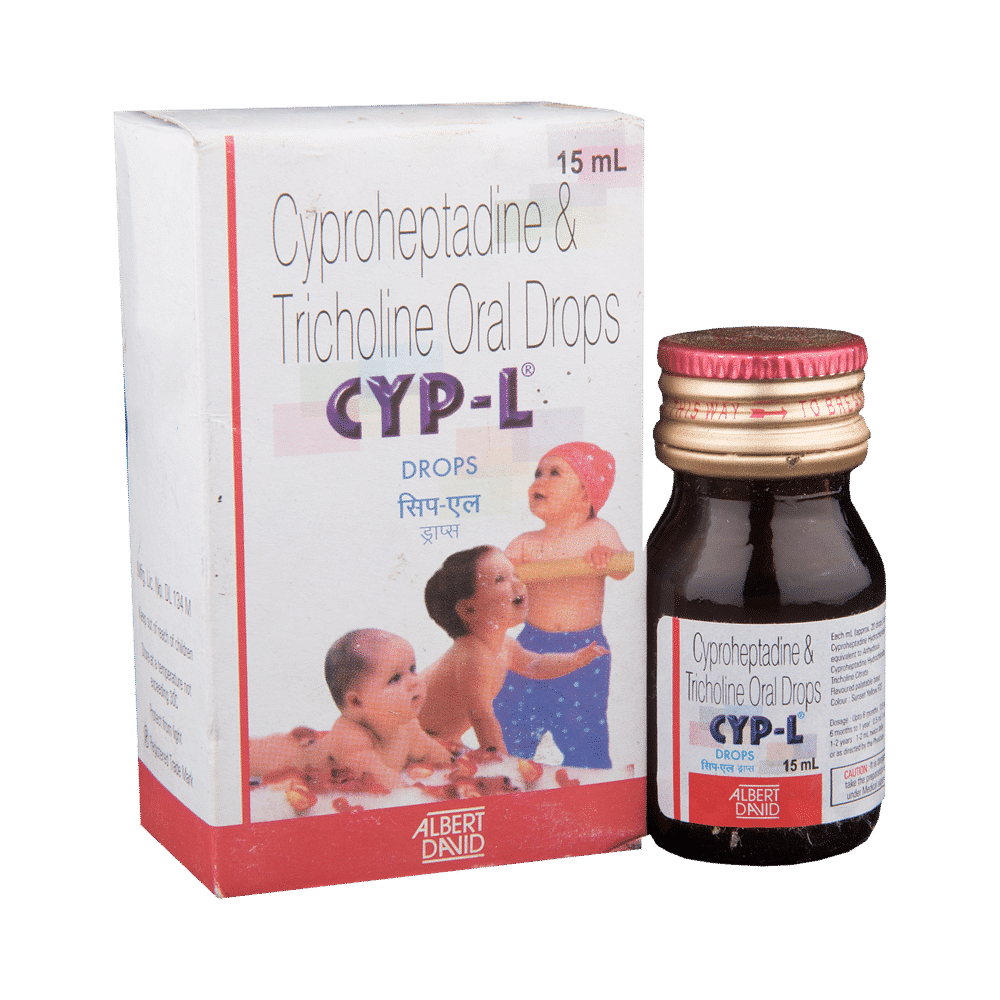
Cyplol Oral Drops
Manufacturer
Asgard Labs Private Limited
Salt Composition
Cyproheptadine (1.5mg) + Tricholine Citrate (55mg)
Key Information
Short Description
Cyplol Oral Drops is a combination of cyproheptadine and tricholine citrate, used to stimulate appetite in children and treat allergic conditions.
Dosage Form
Oral Drops
Introduction
Cyplol Oral Drops is a combination of two active medicines, cyproheptadine and tricholine citrate. Together, these medicines help stimulate appetite (hunger) in children. It is also given to treat allergic conditions in children. The medicine is available in the form of oral drops.
Directions for Use
Do not increase or decrease the dose by yourself as the dose is prescribed based on your child's condition, body weight, and age.
How it works
Cyplol Oral Drops contains two medicines, cyproheptadine and tricholine citrate. Together, they stimulate the urge to eat (appetite). Cyproheptadine acts by reducing the effect of serotonin (a chemical messenger) in the hypothalamus, a part of the brain which regulates appetite. Tricholine citrate also helps in increasing appetite and spares amino acids for muscle enhancement.
Quick Tips
Dry mouth may occur as a side effect. Frequent mouth rinses, good oral hygiene, increased water intake, and chewing on sugarless candy may help. Cyplol Oral Drops can cause a bitter taste in your child's mouth. Eating a piece of citrus fruit or sugarless candy may help. Never increase or decrease the dose by yourself as the dose is prescribed based on your child's condition, body weight, and age. Do not give Cyplol Oral Drops to increase your child's body weight under normal conditions. It is prescribed to treat malnutrition due to chronic illness. Call your child's doctor right away if your child exhibits allergic rash, facial swelling, or breathing difficulty soon after the intake of Cyplol Oral Drops.
Related Medicines

Cypon Drops

Appitize Oral Drops

Cyprodiv Oral Drops

Cipgo Oral Drops

Hunger Oral Drops

Cyprolive Oral Drops

Trycipzip Oral Drops

CYP-L Drops

Cypget Oral Drops

Luxiton Oral Drops
Frequently asked questions
My child is having a long-term illness and is on medication. He is underweight with poor nutritional status and doesn't feel like eating anything. Can I give Cyplol Oral Drops?
Loss of appetite can sometimes occur as a side effect of some medications. If given, Cyplol Oral Drops may help resolve this issue by boosting your child’s appetite and hunger, leading to improved nutritional status. It is crucial to consult your child's doctor before administering Cyplol Oral Drops to ensure the correct dosage and duration. Results usually appear within a few days to weeks. It's important to inform your child's doctor if they are taking any other medicines.
My child is restless and unable to sleep properly at night. Can I give Cyplol Oral Drops?
Cyplol Oral Drops can cause drowsiness as a side effect, but it should not be used to induce sleep in children. Always consult your child's doctor if you are experiencing issues with sleeping or if they are restless at night. It is important to rule out any underlying conditions that might be contributing to the restlessness.
How much Cyplol Oral Drops should I give to my child?
The correct dose of Cyplol Oral Drops for your child must be determined by their doctor. This dosage is calculated based on your child's weight and age.
How should Cyplol Oral Drops be stored?
Cyplol Oral Drops should be stored at room temperature, in a dry place away from direct sunlight and heat. All medicines should always be kept out of reach and sight of children to prevent accidental ingestion.
When do I need to call my child’s doctor right away?
Always seek your child's doctor's guidance if you have any concerns about the use of this medication, including dosage, duration or side effects. If your child experiences serious side effects such as allergic reactions (e.g., facial swelling, difficulty breathing), liver problems (e.g., dark-colored urine, yellowing of eyes or skin), excessive sleepiness, rapid heartbeat, hallucinations, feeling confused or hyperactive, trouble passing urine, irritability, and vision changes.


